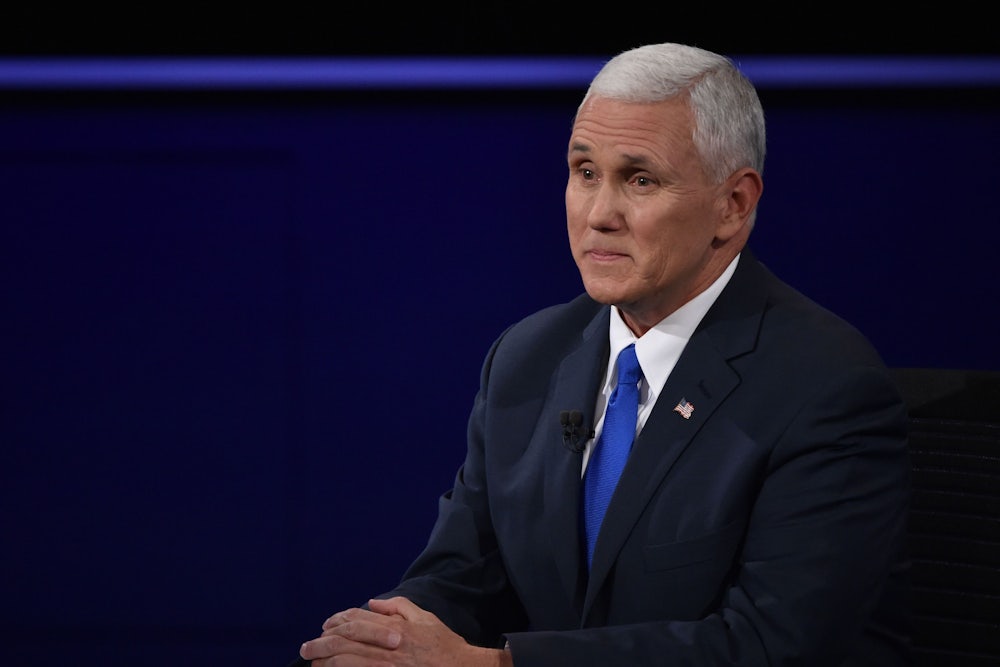Just about every time Donald Trump cuts a deal, someone’s getting scammed—students, workers, charity donors, veterans, piano makers, taxpayers, models, you name it. The lone vice presidential debate of 2016 was at bottom a reminder that his selection of a running mate was no exception.
The only question now is who the true marks are: Trump’s supporters, or Mike Pence’s allies in the elite ranks of the Republican Party?
For an hour and a half on Tuesday night, the Republican Party’s vice presidential nominee parried with Democrat Tim Kaine as if Trump were as mild mannered as Mitt Romney and as doctrinaire as Paul Ryan. He shook his head in disbelief when Kaine faithfully recited Trump’s litany of offenses—his racist and sexist attacks on political and legal enemies, his affinity for autocrats and dictators, his promises to deport all immigrants and ban Muslim travel and immigration—as if Kaine had just invented them.
Pence represented his ticket by mentioning Trump’s name as infrequently as possible and glossing over all the ways Trump threatens Republican Party dogma. He failed, repeatedly, to defend Trump when Kaine prodded him to. It’s possible to interpret Pence’s approach, as some analysts have, as a kind of damage-mitigation strategy to preserve his viability to run for president in 2020. But we don’t even need to reach the question of Pence’s future ambitions to explain his performance. His evasions and deceptions are a big part of what’s propping up the rickety GOP union. Trump and Pence are either lying to voters about their platform reform or lying to officials in the Republican Party about it. If the truth were known, the union would fall apart.
The basic incompatibilities giving shape to the con have been clear for some time. In certain key ways, Trump is a standard issue Republican, exemplified by support for supply-side tax policy and opposition to environmental and financial regulation. But Trump shored up and grew his political base by promising to depart from GOP leadership objectives in key ways. He embarrassed party elites by excoriating amnesty and promoting a maximally hostile and restrictionist immigration policy. He has proposed abrogating major trade and defense treaties. And he’s rejected the idea that the largest federal retirement programs (Social Security and Medicare) should be shrunk and privatized, contravening decades of movement conservative orthodoxy.
Over the course of his career, Pence has been on the elite side of each one of these particulars. As a congressman, he supported President George W. Bush’s efforts to liberalize immigration policy, and privatize Social Security, and, at least until he became Trump’s running mate, the Indiana governor supported corporate-backed trade policies including the fledgling Trans-Pacific Partnership.
Asked during the debate how the Trump-Pence administration would extend the solvency of Social Security, Pence neither addressed his legislative history of supporting the program’s devolution nor Trump’s opposition to entitlement reforms, saying simply, “We’re going to meet the obligation to our seniors.”
This typified Pence’s performance. At a high level of generality, it isn’t unusual for presidential nominees to select running mates with whom they have long-standing substantive disagreements (though usually not as significant as the ones dividing Trump and Pence). But the expectation is always that the vice presidential nominee will subordinate his or her priorities to those of the campaign, and ultimately the administration.
This is not how Pence’s potential vice presidency is being sold to the Republican officeholders who are wary of Trump, and whom Trump in many cases has humiliated. The campaign reportedly promised potential running mates they’d be handed enormous policy portfolios (“Donald Jr. explained that his father’s vice president would be in charge of domestic and foreign policy”). When Trump selected Pence, it came as a huge relief to congressional Republicans distressed at the thought that a president of their own party might thwart their agenda.
Over the course of the campaign, with respect to just about every point of disagreement, Pence has bent to Trump, but when Pence visited Capitol Hill last month, he went out of his way to insist that these differences are overstated or imagined. And while Pence got an earful in meetings with fellow Republicans, those Republicans have essentially decided, as Politico put it, to “bet it all on Pence.” A few days after meeting with Pence, Trump’s one-time nemesis Senator Ted Cruz endorsed the Republican ticket.
If the past 16 months have been any indication, the sucker will prove to be Trump’s supporters: the same people who ate up his false claim to be funding his own campaign with his massive wealth, who then opened up the small donor spigot and thus unwittingly funneled donations to his various business interests.
But in this case it’s hard to say if Trump even knows whether the true suckers are GOP voters, GOP elected officials, or both. I’m not sure Pence knows either.
We won’t know for a few days who won the debate in the eyes of the public. But Pence’s bottom-line goal was to disguise or deny Trump’s ignorance and the basic indecency of his platform. He pulled it off because it’s a necessary part of the ruse, but it was a strained effort because Trump’s ignorance and indecency are difficult to wish away.
Politicians frequently get caught saying different things to different audiences, telling constituents one thing and donors another, and when they do, there’s often hell to pay. But a presidential candidate holding his party together with one set of promises and his voters with another is a first: the ultimate con in a campaign defined by cons.
